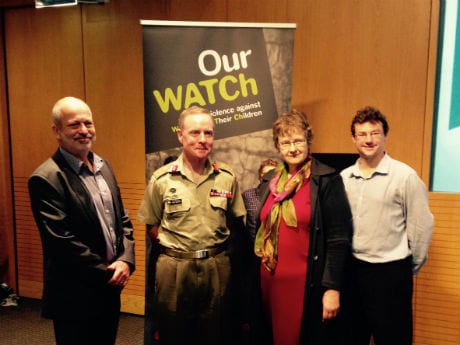When Margaret Simons was a police reporter for The Age thirty years ago she spent many nightshifts listening to the police scanner.
“Again and again we’d hear reports of a domestic with a sort of weary attitude,” the director of the Centre For Advancing Journalism said. “It’s ‘just’ a domestic.”
The prevailing belief, which Simons accepted uncritically at the time, was that these incidents weren’t a story. It is only relatively recently, she explained at an Our Watch meeting in Sydney on Monday, that this view has started to change.
“We went from ‘it happens all the time therefore it’s not a story’ to it happens all the time therefore it’s a hell of a story,” she said.
It echoed, profoundly, an observation that Lieutenant General David Morrison had made just before Margaret’s presentation.
Speaking at the same Our Watch media advisory group meeting, Morrison explained his view, albeit “unformed by academic research with no anthropological or sociological background”, that culture is largely formed of “the stories we tell ourselves about ourselves”.
“It doesn’t matter if you are an army, a corporate entity, a football team or indeed a society, these stories are absolutely intrinsic in how we live our lives,” Morrison said. “In the army, in the 4th estate, in corporate Australia and in government – those stories are overwhelmingly masculine and overwhelmingly biased to the male over the female. That is a bold claim but I am prepared to stand by it absolutely.”
Margaret’s observation that domestic incidents were routinely regarded as private and non-stories is a case in point. How else can we reconcile the routine dismissal of women being assaulted in their own homes?
The ugly but inescapable reality is that the right of men to behave in their homes as they saw fit was regarded as more important and unassailable than the right of women to live free from violence. In some respects, it still is.
In his military career spanning three decades General Morrison has witnessed an extraordinary amount of violence – often propagated by men against women and children. In recent times he came to understand this violence was not limited to conflict zones.
“That level of violence is often a feature of Australian society but it is played out, outside the lens of a photographer, behind close doors, with neighbours and even family members turning a deaf ear to what is happening,” Morrison explained.
Ignoring it and tackling it is a domestic issue as much as it is a workplace issue. Morrison, who will retire as chief of army in a few weeks, said there are 800,000 working women in Australia who are affected by domestic violence. “For many of these women the workplace is the only refuge,” he said.
Tackling this requires a level of leadership and commitment that is eluding Australia.
“I’ve remained relatively apolitical during my career, but there’s a paucity of leadership at government level and within corporate Australia that needs to change,” he said. “The impact of a leadership team buying in very overtly can’t be understated.”
At the beginning of his presentation Morrison explained why in some respects he is “spectacularly unsuited” for discussing gender equality, women and violence.
“I am a 59 year old white anglo-saxon, heterosexual male who has never been discriminated against for any reason in my entire life.”
Later he said, “Women are denied opportunities that are accorded to me as a result of my birth right as a male. They face barriers that are sometimes tangible but sometimes intangible and it doesn’t mater if it happens in a Western-developed society such as ours, or a country in the developing world with a different culture. It is a societal issue that men and women need to address.”
Morrison is the beneficiary of many of life’s privileges. The fact he recognises and openly acknowledges that is precisely why he is capable of meaningful leadership in this realm. He sees the systemic advantage in being a man and is no longer willing to accept it as reasonable. Put another way, too many of the stories we tell ourselves entrench the inequality between men and women.
The question I asked him and will ask you is this: how do we get more leaders to reach the same conclusion?
If you or someone you know is impacted by sexual assault or family violence, call 1800RESPECT on 1800 737 732 or visit www.1800RESPECT.org.au In an emergency, call 000.




